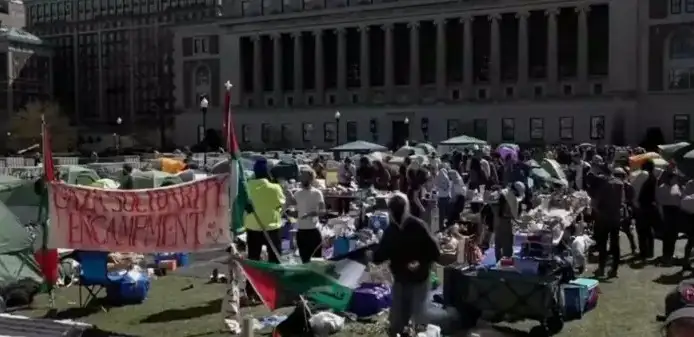“Let them pray!”: students of U.S. universities start pro-Palestinian protests on campuses
In a wave of solidarity with Palestine, students from universities across the United States have taken over the campuses in a series of peaceful protests, demanding an end to the Israeli actions in Gaza, expressing support for Palestinian rights and calling for their universities to divest from companies with financial ties to Israel. More than 900 students were detained at colleges and universities across America, Kazinform News Agency correspondent reports.

From Ivy League campuses to community colleges, students have mobilized in solidarity with Palestine, demanding an end to the violent acts and advocating for Palestinian rights. The series of protests started in response to Columbia University students’ mass-arrest by New York City Police Department during their pro-Palestinian on-campus encampment on April 17. Students of Columbia University sparked a chain of pro-Palestinian protests across the United States: from Harvard University, Yale University, MIT to Cornell University, Berkeley University and Stanford University, over 40 campuses joined the protest.
The demonstrators' central demand is for universities to divest from organizations that are connected with Israeli forces, which aligns with the principles of the Boycott, Divestment, and Sanctions (BDS) movement. The premise is that by cutting off financial relations with such organizations, institutions may demonstrate their commitment to social justice and human rights. The mainly calm but passionate demonstrations reflected a growing global mood denouncing Israeli policy in Palestine.
Students who participated in the protests emphasized the necessity of raising awareness about the Palestinian cause and standing in solidarity with people facing injustice. Many people spoke out against the unequal power dynamics fostered by Israel’s government, urging a resolution that respects the rights and dignity of all people in the region.
Outside the campuses, individuals discussed the complexities of the Israeli-Palestinian conflict and the role of the United States in the region. University administrations and authorities have responded differently to the protests: some initiated arrests and suspension of the students involved, yet organizers remained consistent in their commitment to advocating for Palestinian rights.
House Speaker Mike Johnson made a visit to Columbia University's campus, where he asserted his intention to urge President Joe Biden to intervene in the ongoing pro-Palestinian protests that have persisted on campus. Johnson indicated that this intervention could involve considering the deployment of the National Guard to dismantle the encampments.
A viral video from Ohio State University circulated on social media showcasing students chanting “Let them pray” in a defensive formation protecting praying muslim comrades, while being physically pushed by the police forces. On April 25, The Lantern, Ohio State University's student newspaper, published a report titled "University Confirms Absence of Snipers on Ohio Union's Roof". However, the article was removed after it was discovered that law enforcement officers depicted in social media posts were armed with long-range firearms. Despite this, there was no confirmation about the snipers as the university rejects any comments.
The demonstrations are described to bear similarities to the 1968 protests, particularly in magnitude and tactics, mirroring opposition to the Vietnam War. The Guardian described the protests as probably the most significant student movement since the anti-Vietnam campus rallies of the late 1960s.
As the protests gain pace, organizers are certain that their united efforts will have an impact. With plans for continued actions and alliances with other social justice movements, students are motivated to initiate change and contribute to a more just and peaceful society for everyone.
Students from several institutions in more than 20 states, including Washington D.C, Texas, Massachusetts, Florida, Arizona, and California, are still protesting to this day. The support also came from abroad with people from Australia, Canada, Egypt, France, Italy and the United Kingdom joining in and conducting protests of their own.
